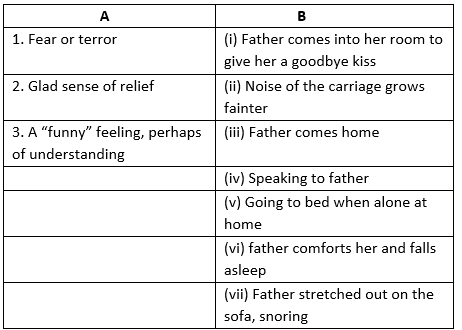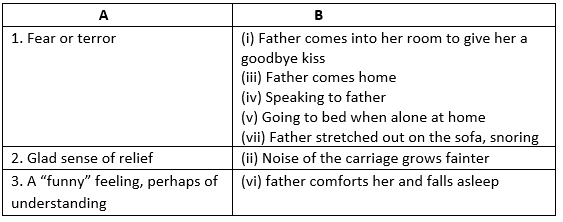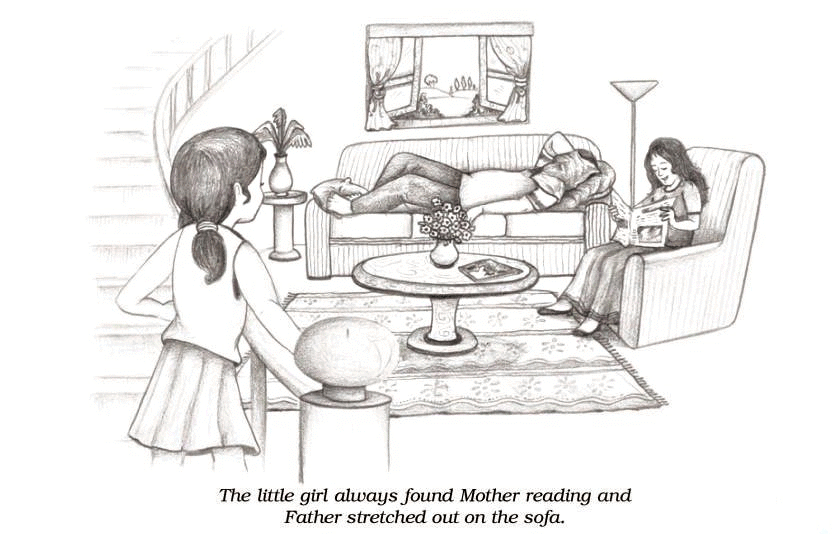NCERT Solutions for Class 9 English Beehive Chapter 3 - The Little Girl
Thinking about the Text
I. Given below are some emotions that Kezia felt. Match the emotions in Column A with the items in Column B. Ans:
Ans:
II. Answer the following questions in one or two sentences.
Q1: Why was Kezia afraid of her father?
Ans: Kezia was afraid of her father because he was often aggressive and spoke loudly, which made her anxious. He would scold her frequently and even punish her physically, even when she tried to admit her mistakes.
Q2: Who were the people in Kezia’s family?
Ans: Kezia’s family consisted of her mother, father, grandmother, and herself.
Q3: What was Kezia’s father’s routine
(i) Before going to his office?
Ans: Before going to his office, Kezia’s father usually went into her room to give her a goodbye kiss.
(ii) After coming back from his office?
Ans: After returning from his office, he ordered tea to be brought into the drawing room. He also asked the mother to bring him the newspaper and his slippers, and asked Kezia to pull off his boots.
(iii) On Sundays?
Ans: Kezia's father would stretch out on the sofa on Sundays. He would cover his face with his handkerchief, put his feet on one of the cushions and sleep soundly.

Q4: In what ways did Kezia’s grandmother encourage her to get to know her father better?
Ans: Kezia’s grandmother encouraged her to get to know her father better by sending her to the drawing room to talk to her parents on Sundays. She also suggested Kezia make a pin cushion out of a beautiful piece of yellow silk as a gift for her father’s birthday.
III. Discuss these questions in class with your teacher and then write down your answers in two or three paragraphs each.
Q1: Kezia’s efforts to please her father resulted in displeasing him very much. How did this happen?
Ans: Ironically, Kezia’s efforts to please her father ended up upsetting him. Every Sunday, her grandmother sent her down to the drawing room to have a nice talk with her father and mother. But her presence always irritated the father. He used to call her 'little brown owl'.
One day, her grandmother told her that her father's birthday would be next week and suggested that she should make him a pin-cushion as a gift. After stitching three sides of the cushion with double cotton with great care and effort, Kezia was stuck as to what to fill the cushion with.
Since her grandmother was busy in the garden, she searched her Mother's bedroom for scraps. Finally, she discovered sheets of paper on the bedside table. She gathered these, tore them up, and filled the cushion with the torn pieces.
Unfortunately, her efforts to please her father not only went in vain but also had an unanticipated consequence. This was because the sheets she had torn were her father’s speech for the Port Authority. Her father scolded her for touching things that did not belong to her and punished her by hitting her palm with a ruler.
Q2: Kezia decides that there are “different kinds of fathers”. What kind of father was Mr. Macdonald, and how was he different from Kezia’s father?
Ans: Kezia compared her father with Mr. Macdonald, her next-door neighbour. Mr. Macdonald was a loving, gentle, and forgiving father who always smiled and played with his children. He treated them in a friendly manner and never punished them.
In contrast, Kezia's father was very harsh and strict, acting as a strict disciplinarian. While Mr. Macdonald engaged in playful activities with his children during his free time, Kezia's father was often serious and demanding, which made her feel afraid of him.
Q3: How does Kezia begin to see her father as a human being who needs her sympathy?
Ans: While at home with Alice, the cook, Kezia feels frightened after her mother and grandmother go to the hospital. That night, she had a nightmare and called for her grandmother. To her surprise, she finds her father standing by her bed. He comforts her by holding her close, allowing her to snuggle under his arm. As she lies next to him, she begins to understand that he works hard every day, which leaves him too tired to be playful like Mr Macdonald.
This realisation shifts her feelings towards him; she acknowledges that he has a big heart and expresses sympathy for his struggles. This moment marks a turning point in her perception, as she starts to see him as a human being who needs her understanding and support.
Thinking about the Text
I. Look at the following sentence.
There was a glad sense of relief when she heard the noise of the carriage growing fainter... Here, glad means happy about something. Glad, happy, pleased, delighted, thrilled and overjoyed are synonyms (words or expressions that have the same or nearly the same meaning.) However, they express happiness in certain ways.
Read the sentences below.
- She was glad when the meeting was over.
- The chief guest was pleased to announce the name of the winner.
Q1: Use an appropriate word from the synonyms given above in the following sentences. Clues are given in brackets.
(i) She was __________ by the news of her brother’s wedding. (very pleased)
Ans: She was thrilled by the news of her brother’s wedding.
(ii) I was __________to be invited to the party. (extremely pleased and excited about)
Ans: I was delighted to be invited to the party.
(iii) She was __________ at the birth of her granddaughter. (extremely happy)
Ans: She was overjoyed at the birth of her granddaughter.
(iv) The coach was __________ with his performance. (satisfied about)
Ans: The coach was pleased with his performance.
(v) She was very __________ with her results. (happy about something that has happened).
Ans: She was very happy with her results.
Q2: Study the use of the word big in the following sentence.
He was so big− his hands and his neck, especially his mouth…
Here, big means large in size.
Now, consult a dictionary and find out the meaning of big in the following sentences. The first one has been done for you.
(i) You are a big girl now. Older
(ii) Today, you are going to take the biggest decision of your career. _________
Ans: most important
(iii) Their project is full of big ideas. _________
Ans: innovation/important/ambitious
(iv) Cricket is a big game in our country. _________
Ans: popular
(v) I am a big fan of Lata Mangeskar. _________
Ans: great
(vi) You have to cook a bit more as my friend is a big eater. _________
Ans: gourmand
(vii) What a big heart you’ve got, Father dear. _________
Ans: generous
II. Verbs of Reporting
Study the following sentences.
- “What!” screamed Mother.
- “N-n-no”, she whispered.
- “Sit up,” he ordered.
The italicised words are verbs of reporting. We quote or report what someone has said or thought by using a reporting verb. Every reporting clause contains a reporting verb. For example:
- He promised to help in my project.
- “How are you doing?” Seema asked
We use verbs of reporting to advise, order, report statements, thoughts, intentions, questions, requests, apologies, manner of speaking and so on.
Q1: Underline the verbs of reporting in the following sentences.
(i) He says he will enjoy the ride.
Ans: He says he will enjoy the ride.
(ii) Father mentioned that he was going on a holiday.
Ans: Father mentioned that he was going on a holiday.
(iii) No one told us that the shop was closed.
Ans: No one told us that the shop was closed.
(iv) He answered that the price would go up.
Ans: He answered that the price would go up.
(v) I wondered why he was screaming.
Ans: I wondered why he was screaming.
(vi) Ben told her to wake him up.
Ans: Ben told her to wake him up.
(vii) Ratan apologised for coming late to the party.
Ans: Ratan apologised for coming late to the party.
Q2: Some verbs of reporting are given in the box. Choose the appropriate verbs and fill in the blanks in the following sentences. (i) “I am not afraid,” __________ the woman.
(i) “I am not afraid,” __________ the woman.
Ans: “I am not afraid,” replied the woman.
(ii) “Leave me alone,” my mother __________.
Ans:“Leave me alone,” my mother shouted.
(iii) The children __________ that the roads were crowded and noisy.
Ans: The children were complaining that the roads were crowded and noisy.
(iv) “Perhaps he isn’t a bad sort of a chap after all,” __________the master.
Ans: “Perhaps he isn’t a bad sort of a chap after all,” remarked the master.
(v) “Let’s go and look at the school ground,” __________ sports teacher.
Ans: “Let’s go and look at the school ground,” suggested the sports teacher.
(vi) The traffic police __________ all the passers-by to keep off the road.
Ans: The traffic police ordered all the passers-by to keep off the road
Speaking
Form pairs or groups and discuss the following questions.
Q1: This story is not an Indian story. But do you think there are fathers, mothers and grandmothers like the ones portrayed in the story in our own country?
Ans: Though the story isn’t set in India, its characters feel familiar here. Kezia’s strict father, who can be kind sometimes, is like many Indian fathers who lead the family and expect respect, a key part of our culture. His strictness, which scares Kezia, is similar to how some Indian kids see their parents’ authority. Her mother, who follows her father’s rules, is like some Indian mothers who keep the family in order but may seem less warm. The loving grandmother, who comforts Kezia and brings the family closer, is like Indian grandmothers in joint families who spread love and unity, a big cultural value. These ideas of strict fathers, obedient mothers, caring grandmothers, and respect for family roles are common in many Indian homes, especially traditional ones.
Q2: Was Kezia’s father right to punish her? What kind of a person was he?
You might find some of these words useful in describing him: Ans: It was necessary to make Kezia realise her mistake and learn her lesson. The father could have acted a bit more supportive and should have tried to understand her problem from her perspective, too.
Ans: It was necessary to make Kezia realise her mistake and learn her lesson. The father could have acted a bit more supportive and should have tried to understand her problem from her perspective, too.
Kezia’s father gives us an image of a strict and emotionless father in the beginning. He ordered everything around the home. He was a short-tempered person and wore his anger on his sleeves. He punished Kezia for her mistakes and never had proper communication with her. Once, when Kezia tore his speech paper, he hit her badly. By the end of the story, we get to know that he had a gentle heart and was actually an affectionate and caring person.
Writing
Has your life been different from or similar to that of Kezia when you were a child? Has your perception of your parents changed now? Do you find any change in your parents’ behaviour vis-à-vis yours? Who has become more understanding? What steps would you like to take to build a relationship based on understanding? Write three or four paragraphs (150–200 words) discussing these issues from your own experience.
Ans: My life experience was similar to that of Kezia when I was a child. Although I was never physically punished by my parents, I often felt that I was not accepted for who I was. I was constantly encouraged to work harder, achieve better scores, and excel in various activities. Despite my efforts, I rarely received appreciation when I didn't achieve top positions in class or competitions. This pressure pushed me to exceed my limits, creating a significant strain in our relationship. Over the years, I have noticed a gradual change in my parents' attitudes. They have become more accepting of who I am, and we have worked on improving our communication to better understand each other's likes and dislikes. To build a relationship based on understanding, it is essential to have open communication. Each person should be accepted for who they are, without attempts to change them based on personal perceptions. This acceptance fosters individuality and allows individuals to feel comfortable being their true selves. In my experience, the key to a better relationship lies in mutual respect and understanding. It is important to express any discomfort about certain behaviours without trying to alter the other person fundamentally. By embracing each other's differences and maintaining a dialogue, we can nurture a more harmonious relationship.
|
263 videos|1418 docs|124 tests
|
FAQs on NCERT Solutions for Class 9 English Beehive Chapter 3 - The Little Girl
| 1. What is the central theme of "The Little Girl"? |  |
| 2. How does the protagonist, Kezia, feel about her father in the story? |  |
| 3. What lessons does Kezia learn by the end of the story? |  |
| 4. How does the author portray the character of Kezia's father? |  |
| 5. What role does the setting play in "The Little Girl"? |  |






















